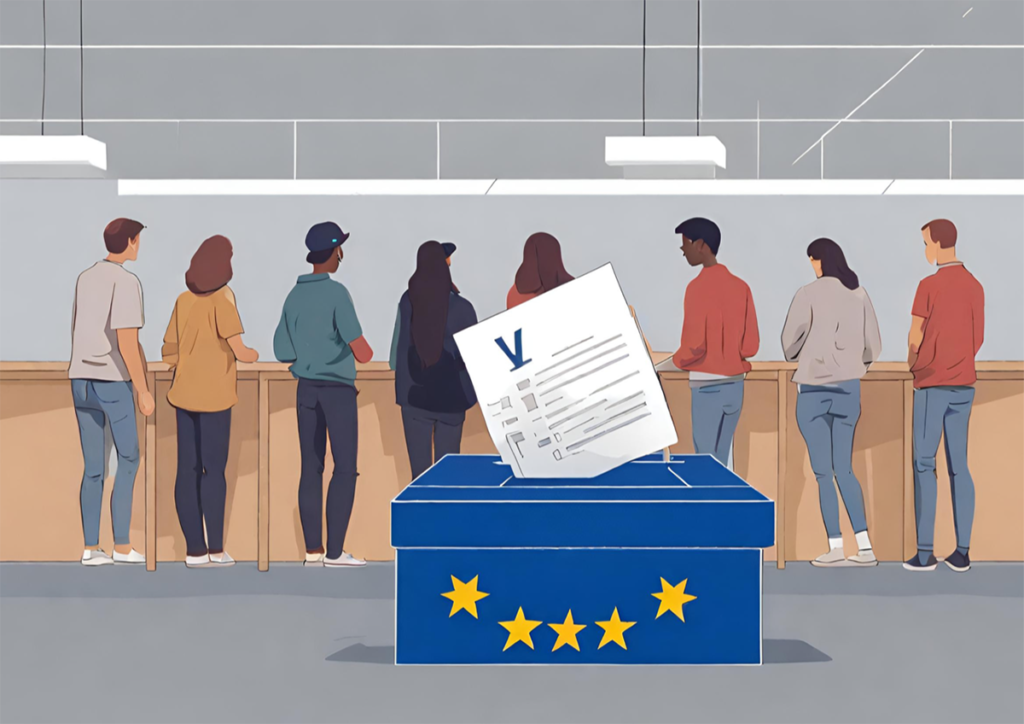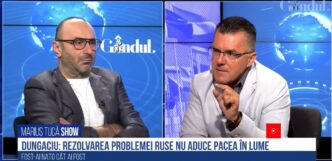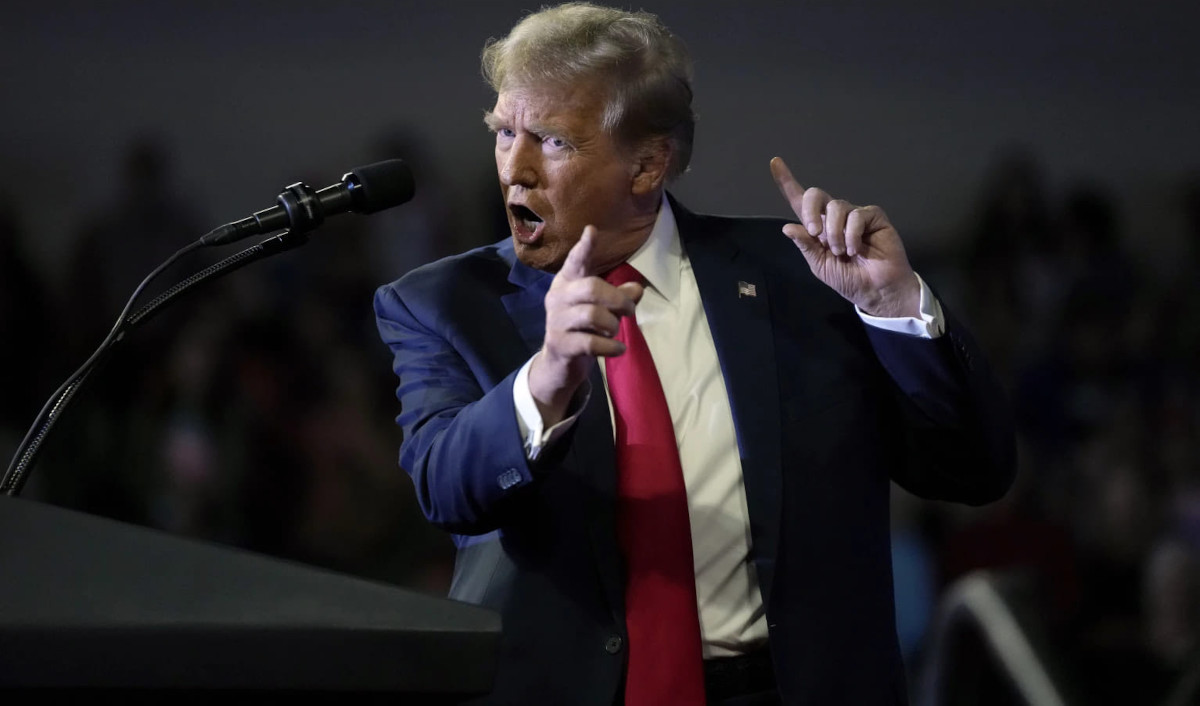
Romanians will be called upon to vote four times in 2024. The first time is on th of the 9June, when we elect our MEPs, the people we send to Brussels to represent us in the European Union.
These elections, the Europarliamentary elections, are the “Cinderella” of Romanian votes because they have the lowest turnout. People are mobilised when they elect their mayors and president, i.e. individual and well-defined figures, and less so parliamentarians and MEPs, because the latter are generally associated with the “political class” and the frustrations accumulated in society over the years.
This year, however, the Europarliamentary elections are turning ‘Cinderella’ into a princess and setting the electoral tone for all the other elections, in chronological order: local, parliamentary and presidential.
First and foremost, the European Parliament elections are important because they can radically change the destiny of Europe and the world. In a context where the far right is growing strongly and is scoring significantly in domestic elections (see the Netherlands, Germany, Italy, etc.), the European Parliament may also be contaminated by this phenomenon.
In one scenario, the far-right can win a majority of seats in the Parliament, i.e. make the next EU laws. To note: the far-right (fascism, nazism) is the political doctrine behind the Holocaust, the extermination of 6 million Jews in the 40s. The extreme right.
The far right is hate. And the far left (communism) is responsible for the deaths of tens of millions of people around the world and is still claiming victims today (see North Korea, China etc). Both extremes mean death, censorship and deprivation of rights and freedoms.
In a social context full of frustration, deprivation and discontent, people tend to choose radicalism. The world is coming out of a pandemic, living through two major wars and facing rising prices for everything around it. All this has given way to conspiracy theories and radical parties. In many European countries, radicalism is represented by right-wing extremists. In Romania, right-wing extremism is claimed by AUR and SOS, two growing parties with Russian rhetoric and political leaders close to the Kremlin.
This year’s European parliamentary elections are all the more important because they will reshape the future of Europe and the world. Extremism will reshape Europe or not.
Between fanaticism and tolerance
Georgiana Țăranu, an assistant professor at the Faculty of History and Political Science (Ovidius University, Constanța), with research on nationalism and fascism in the 20th century, explained to ISE why the European Parliamentary elections are important and the dangers of not voting:
“Voting for the EP is also a vote for how you want Romania to be represented in the EU, but there is more. It’s also a vote for how you want the country you go to live in to be, what kind of atmosphere you want to find there, how you want people to look at you on the street, at work, at the supermarket and so on”.

Georgiana Țăranu explains that misinformation is one of the biggest dangers the electorate will face, and the most targeted are young people, because they spend most time on social media, the most fertile environment for fake news:
- “Young people are the main target of it, because they spend most of their time on social media and that’s where they get almost all their information from. And online is the easiest place to misinform, to throw accusations, conspiracy theories and harsh verdicts. Simply put, in this election the battle will be between two camps, between fanaticism and tolerance. On the one hand, there are those who don’t talk, but shout, threaten, incite hatred and violence, tell you that they know exactly who is to blame for everything that goes wrong and quickly point to a person, a party, a country, etc. These are the radicals. They are the ones who, if they disagree with something, would like that thing to go away. They are the ones who want some kind of saviour in politics. On the other hand, there are also the moderate people, those who will tell you that there are no miracle solutions, but that we have to be patient and cautious. The EP elections are about what you want the Europe you would like to live in to look like. And about the people you’d trust to vote on important things like how EU funds are shared, what we do about climate change, artificial intelligence or the risk of terrorist attacks. It matters a lot who you send there. Each of us can vote for those who think their country can function by isolating themselves from other countries, criticising them and slamming the door in their faces, or for those who would rather sit down with their European colleagues and have a relaxed and civilised discussion and, why not, maybe over a beer, even”.
Ariana Dudună is a 12th grade student at the “Mihai Eminescu” National High School in Constanța and was president of the Constanta Students’ Association. Ariana is 18 years old and is facing her first vote.
- “I want to vote because I believe that our country has many benefits thanks to joining the European Union and the fact that we have the right to vote, which our forefathers may not have had. The right to vote is a right that, after all, some people fought for us to have and we must cherish it and we must make use of it, because a right that you don’t put to use risks not being there tomorrow when you want to, perhaps, use it”, says Ariana.

On the emergence of the danger of extremism, she believes it is a “worrying” phenomenon that has grown out of the pandemic, but the fact that everyone can choose what they want shows that “democracy works”.
- “As for the extremism present throughout Europe in the last years, it is worrying to me, on one hand, and I think it has taken off because of the pandemic in particular. At the same time, however, I also understand that it is, to a certain extent, a necessary evil, because if certain people vote for a party or a group that I do not like, this strictly means that democracy is working, and just as I have the right to vote for groups that others may not like, others have the right to vote for groups that I may not agree with, perhaps extremist groups”.
Extremism is an extremely dangerous phenomenon precisely because it simply creates political instability, believes Stefan Diac, a third-year student at the Faculty of History and Political Science at “Ovidius” University of Constanța, specialising in Political Science.

- “From my point of view, the European parliamentary elections are as important as the national parliamentary elections, but if we look at the history of the European parliamentary elections since Romania has been a member of the EU, we can notice a very interesting phenomenon, namely that the population, the citizens do not consider the same thing. The turnout in the Europarliamentary elections has always been lower than in the national parliamentary elections. Personally, I am going to vote in the Europarliamentary elections, I am really curious and it will be a very interesting election. As far as political extremism in Europe is concerned, personally it is a phenomenon that worries me, for the simple fact that extremism is an extremely dangerous phenomenon precisely because it simply creates political instability. The more political instability there is, the more democracy is at risk.”
What is the European Union, how and why it was created

The EU emerged after a war. After the Second World War, when the world was dried out in every way. The Second World War came after the First, just 20 years after the First.
So Germany and France, among the main belligerent powers, pooled their steel and coal, which were the raw materials for war. In other words, if you don’t have coal and steel, you don’t have war. And they pooled them in what they called the European Coal and Steel Community (ECSC).
On the 18th of April 1951 in Paris, the ECSC Treaty was signed by Robert Schuman (France), Konrad Adenauer (Germany), Paul van Zeeland and Joseph Meurice (Belgium), Carlo Sforza (Italy), Joseph Bech (Luxembourg), Dirk Stikker and Jan Van den Brink (Netherlands).
Other countries joined the Community, and at some point the European Economic Community (EEC Treaty or Treaty of Rome) was formed, with the following purposes
- the abolition of customs duties between Member States;
- a common customs tariff for imports;
- the introduction of a common agricultural and transport policy;
- the creation of a European Social Fund;
- the creation of a European Investment Bank;
- developing closer relations between Member States.
This is how the European Union was born, a place where countries agree on how they work, and ‘standardise’ their way of working, acting and reacting.
Today, 27 countries are members of the European Union: Austria, Belgium, Bulgaria, Czech Republic, Cyprus, Croatia, Denmark, Estonia, Finland, France, Germany, Greece, Hungary, Ireland, Italy, Latvia, Lithuania, Luxembourg, Malta, Poland, Portugal, Romania, Slovakia, Slovenia, Spain, Sweden, the Netherlands. In June of 2016, the UK decided to leave the European Union. As of 31 January 2020, the United Kingdom is no longer a member state.
How the EU works, main institutions: EP, EC and European Council
The European Union has a Parliament, a Commission and a Council.
The European Parliament is made up of 705 MEPs elected from the 27 countries, based on the number of inhabitants. The larger the population of a country, the more MEPs it will send to the EU. Romania has 33 MEPs.
MEPs are not organised according to the country they come from, but according to political preferences and vision. They form political groups. There are currently 7 political groups in the European Parliament.
The current 7 political groups are:
Group of the European People’s Party (Christian Democrats)
Group of the Progressive Alliance of Socialists and Democrats in the European Parliament
Renew Europe Group
Group of the Greens/European Free Alliance
Group of European Conservatives and Reformists
Identity and Democracy Group
Group of the Left in the European Parliament – GUE/NGL
The European Parliament is led by Roberta Metsola and recently experienced a high-profile corruption scandal when one of its vice-presidents, Eva Kaili, was arrested for allegedly favouring Qatar, a country in the international spotlight for human rights abuses, in exchange for money. Read more here.
The European Commission is the EU’s “government” – the body that executes the policies voted by Parliament. Each country sends a commissioner to the EU, so the commission’s activities are coordinated by a 27-strong group known as the “college”.
It takes decisions on the political and strategic direction of the Commission. The college of commissioners is appointed every 5 years.
The Commission has local offices in each member state, as well as in many countries outside the European Union. The offices in the member states are called representations and are the voice of the Commission in the host country.
Romania has had Leonard Orban (Multilingualism), Dacian Ciolos (Agriculture), Corina Cretu (Regional Policy) and Adina Vălean (Transport) as commissioners. The current head of the European Commission is Ursula von der Leyen (former defence minister in Angela Merkel’s government in Germany).
The European Council is made up of the Presidents of the Member States. It defines the general political guidelines and priorities of the EU, traditionally by adopting conclusions. It does not negotiate or adopt EU legislation.
The European Council is chaired by Charles Michel and Romania is represented on the Council by President Klaus Iohannis or Prime Minister Marcel Ciolacu. See the full composition here.
When Romania joined, what money it took and what representatives it has had so far
Romania became an EU member state in 2007 and, until last year, it received around €80 billion and contributed €26.4 billion, which means an extra €53.6 billion, according to an RFI analysis.
Romania has also participated in the 2009, 2014 and 2019 European Parliament elections. Current Romanian MEPs include former journalists, former presidents and prime ministers, former mayors, ministers, MPs and various specialists. Full list here.
Any Romanian citizen who has reached the age of 18 and has a valid identity card can vote on the 9th of June. Polling stations are open from 07:00 to 21:00 local time.
The right to be elected as Romanian Members of the European Parliament is granted to persons who have reached the age of 23, have the right to vote and are on the lists of a political party, an organisation of citizens belonging to national minorities, a political alliance, electoral alliances or as an independent.
What else you need to know:
- You are not obliged by law to vote in Romania. But it’s good to do so;
- Postal voting in the European elections is not possible in Romania;
- Neither is online voting or proxy voting possible in the European Parliament elections in Romania;
- In Romania, people with disabilities can receive assistance to vote at the polling station or can opt to vote through a special ballot box;
- If you have recently changed your address or residence, we recommend that you check that you are correctly registered on the electoral roll here;
- For many more details about voting in the European Parliamentary elections, here.
Ne bucurăm că ne citești!
Dacă vrei să ne și susții:











